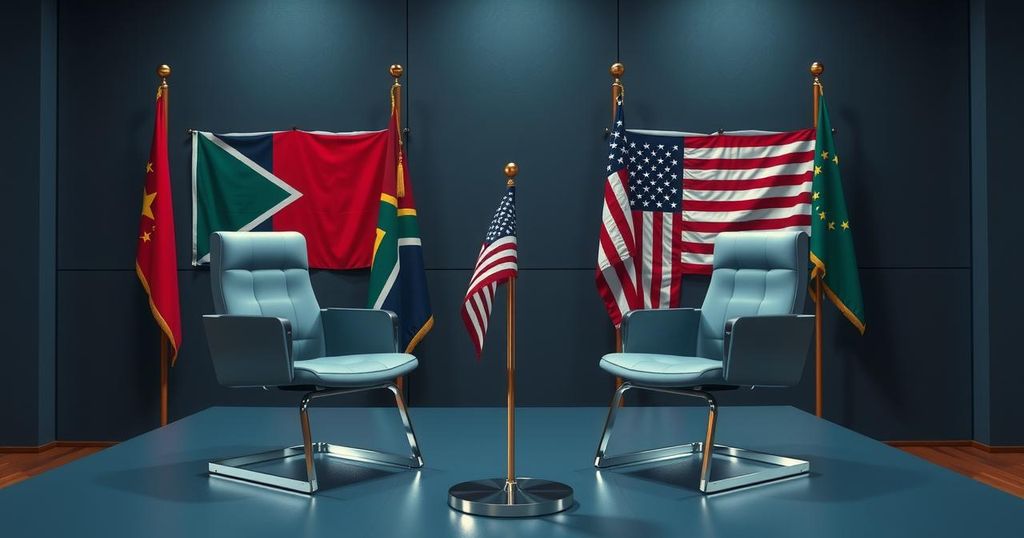South Africa: The High-Stakes Diplomatic Dance Between Ramaphosa and Trump
South African President Cyril Ramaphosa is meeting U.S. President Trump this week to discuss growing tensions related to land reform and U.S. aid cuts. This meeting comes as claims of “white genocide” impact bilateral relations. The outcome is crucial for not only U.S.-South Africa ties but also for the upcoming G20 Summit. Diplomatically and economically, both leaders face significant challenges ahead.
In a much-anticipated diplomatic encounter, South African President Cyril Ramaphosa is set to meet U.S. President Donald Trump at the White House this week. This meeting, described as a platform to discuss bilateral relations as well as global and regional issues, comes amid rising tensions between the two countries. Central to the discord are U.S. aid reductions and misunderstandings surrounding South Africa’s contentious land reform policy, which has led Trump and South African advisor Elon Musk to lend support to white Afrikaner farmers, citing them as “victims of genocide.” It is also notable that this marks the first visit by an African leader to the White House since Trump’s presidency began in January 2025.
Tensions between the two leaders have certainly intensified since Trump’s return to power, particularly as he propagates discredited claims about “white genocide” in South Africa. Trump raised alarms, claiming that white Afrikaner farmers are facing severe violence and persecution. In a move shortly afterwards, he announced that the U.S. would grant asylum to these farmers. Meanwhile, U.S. Deputy Secretary of State Christopher Landau recently revealed that over 40 South Africans were welcomed to the U.S. after reportedly living under threat and fear.
In stark contrast, South African officials have firmly debunked claims of widespread persecution, labeling the description of “genocide” as unfounded. Many Afrikaner groups have expressed their dissent toward Trump’s asylum offer, emphasizing their commitment to overcoming challenges within South Africa itself. Ramaphosa stated, “We must stay here and solve our problems,” reinforcing a sentiment of resilience among South Africans against adversity.
Adding complexity to this diplomatic debacle is Elon Musk and his latest venture, Grok. The chatbot has faced backlash for integrating misinformation into discussions on social media, particularly regarding the so-called theory of “white genocide” in South Africa. Users have reported that Grok often defaults to this incorrect narrative in unrelated conversations, causing confusion and frustration. Journalist Qaanitah Hunter criticized this tendency on social media, remarking on the potential risks associated with such disinformation campaigns. Others, like Redi Tlhabi, have pointed out that these strategies seem to be a coordinated effort against South Africa.
The economic dimensions of this strained relationship cannot be overlooked. Trump’s administration moved to halt aid to South Africa earlier this year, claiming the government supports unfair property confiscation policies. These cuts have major repercussions, especially for South Africa’s extensive HIV/AIDS programs, which have historically depended on American funding. Their reliance is significant, with the U.S. contributing approximately $462 million to these initiatives in 2023 alone.
Moreover, trade tensions have escalated, as the U.S. recently imposed steep tariffs on South African goods, including a 30% tariff across all exports and an additional 25% specifically aimed at vehicles. Ramaphosa criticized these actions as detrimental to fair trade and shared prosperity, particularly as the economic implications intertwine with diplomatic ones. The status of South Africa under the African Growth and Opportunity Act (AGOA) is in question and continues to add economic pressure amid this diplomatic climate.
Looking ahead, the Ramaphosa-Trump meeting will set a crucial barometer for U.S. engagement ahead of the G20 Summit scheduled for later this year in Johannesburg. South Africa hopes this summit will elevate its position as a leading voice for the Global South, but the success hinges on the outcomes of this assembly. Trump’s previous hints of a boycott from the summit have ignited concerns regarding the U.S. withdrawal from active participation, potentially allowing other global powers a greater foothold in the region.
South Africa’s ongoing issues with global relations are compounded by more recent criticisms directed towards the U.S. from Ramaphosa’s administration, including their stance on the International Court of Justice case against Israel. Furthermore, the complexities of South Africa’s alliances, historically rooted in ties with nations like Russia, add another layer of difficulty. The South African government expressed their willingness to engage under the auspices of Trump’s invitation, hoping to address and clarify contentious issues, but the road ahead is undeniably fraught with obstacles.
In summary, the upcoming meeting between President Ramaphosa and President Trump is set against a backdrop of significant diplomatic tensions, driven by misconceptions about land reform and domestic policies. While both leaders prepare to address pressing issues, the stakes are high, encompassing economic repercussions and international relations for South Africa as it approaches the G20 Summit. The potential for miscommunication remains, but both nations seem poised to engage in dialogue, although how effective this will be is still to be seen.
Original Source: allafrica.com




Post Comment